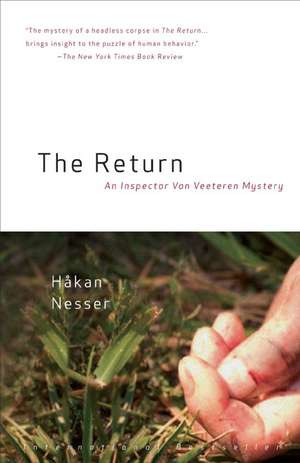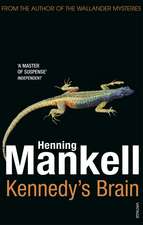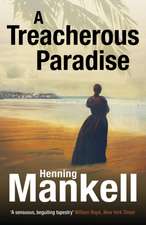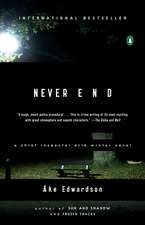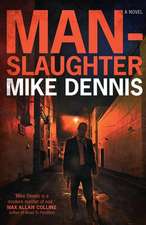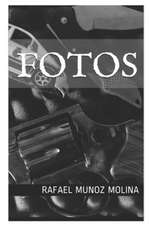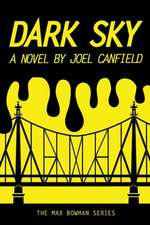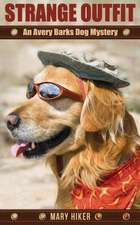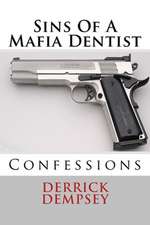The Return
Autor Hakan Nesser Traducere de Laurie Thompsonen Limba Engleză Paperback – 29 feb 2008
Chief Inspector Van Veeteren is forced to unlock the secrets of a nearly perfect murder in this taut psychological thriller.
On a rainy April day, a body—or what is left of it—is found by a young girl. Wrapped in a blanket with no hands, feet, or head, it signals the work of a brutal, methodical killer. The victim, Leopold Verhaven, was a track star before he was convicted for killing two of his ex-lovers. He consistently proclaimed his innocence, however, and was killed on the day of his return to society. This latest murder is more than a little perplexing and Chief Inspector Van Veeteren is determined to discover the truth, even if it means taking the law into his own hands.
Preț: 86.39 lei
Nou
Puncte Express: 130
Preț estimativ în valută:
16.54€ • 17.05$ • 13.88£
16.54€ • 17.05$ • 13.88£
Carte indisponibilă temporar
Doresc să fiu notificat când acest titlu va fi disponibil:
Se trimite...
Preluare comenzi: 021 569.72.76
Specificații
ISBN-13: 9781400030330
ISBN-10: 1400030331
Pagini: 321
Dimensiuni: 134 x 204 x 19 mm
Greutate: 0.25 kg
Editura: Vintage Books USA
ISBN-10: 1400030331
Pagini: 321
Dimensiuni: 134 x 204 x 19 mm
Greutate: 0.25 kg
Editura: Vintage Books USA
Notă biografică
Håkan Nesser was born in 1950 in Sweden. In 1993 he was awarded the Swedish Crime Writers’ Academy Prize for new authors for his novel Mind’s Eye, and is the only author to have won the Academy’s best novel award three times: in 1994 for Borkmann’s Point; in 1996 for Woman With Birthmark; and in 2007 for A Rather Different Story. In 1999 he was awarded the Crime Writers of Scandinavia’s Glass Key Award for the best crime novel of the year for Carambole. His novels have been published to wide acclaim in twenty-five countries.
Extras
Chapter 1
It was the first and the last day.
The steel door was locked behind him and the metallic click hovered for a while in the cool morning air. He took four paces, paused and put down his suitcase. Closed his eyes, then opened them again.
A thin morning mist hung over the deserted car park, the sun was just rising over the nearby town and the only sign of life was the flocks of birds swooping over the fields that surrounded the cluster of buildings. He stood there for a few seconds and indulged his senses. The scent of newly harvested corn wafted into his nostrils. The dazzling light quivered over the asphalt. In the distance, a mile or so to the west, he could hear the persistent hum of traffic on the freeway that carved a path through the open countryside. The sudden realization of the world’s true dimensions gave him a moment of vertigo. He had not set foot outside these walls for twelve years; his cell had been seven feet by ten, and it dawned on him that it was a long way to the town and the railroad station. An incredibly long way, perhaps impossibly far on a day like this.
He had been offered a taxi, that was normal practice, but he declined. Didn’t want to take a shortcut into the world at this early stage. Wanted to feel the burden and the pain and the freedom in every step he took this morning. If he were to have a chance of succeeding in the task he had set himself, he understood what he needed to overcome. Overcome and get the better of.
He picked up his suitcase and started walking. It didn’t weigh much. A few changes of underwear. A pair of shoes, a shirt, pants and a toiletry bag. Four or five books and a letter. He had tried on the clothes he was wearing and signed for them at the equipment store the previous day. Typical prison clothing. Black synthetic-leather shoes. Blue pants. Pale gray cotton shirt and a thin windcheater. As far as the locals were concerned he would be as easily identifiable as a Roman Catholic priest or a chimney sweep. One of the many who wandered into the railroad station carrying a cardboard suitcase, eager to leave. Having spent time out here in The Big Gray between the municipal forest and the motorway. Having been so near and yet so far away. One of them. The easily identifiable.
The Big Gray. That’s what they called it around here. For him it was nameless—just a brief stretch of time and hardly any space. And it was a long time since he’d been worried about other people staring at him; a long time since he’d been forced to turn his back on that kind of superficial and pointless contact. He had left his former life without hesitation; there was no alternative, and he’d never longed to return. Never.
You could say he had never really been a part of it.
The sun rose. He had to stop again after a hundred yards. Wriggled out of his jacket and slung it over his shoulder. Two cars overtook him. A couple of warders, presumably, or some other staff. Prison people in any case. Nobody else ventured out here. There was only The Big Gray here.
He set off once more. Tried to whistle but couldn’t hit upon a tune. It occurred to him that he ought to have sunglasses: Maybe he could buy a pair when he got to town. He shaded his eyes with his hand, squinted and scrutinized the townscape through the dazzling haze. At that very moment church bells started ringing.
He glanced at his wristwatch. Eight. He wouldn’t be able to catch the first train. There again, he hadn’t really wanted to: better to sit in the station café over a decent breakfast and today’s paper. No rush. Not this first day, at least. He would carry out the task he’d set himself, but the precise timing depended on factors he knew nothing about as yet, naturally enough.
Tomorrow, perhaps. Or the day after. If all these years had taught him anything, anything at all, it was precisely this. To be patient.
Patience.
He continued walking purposefully toward town. Took possession of the deserted, sun-drenched streets. The shady alleys leading from the square. The worn cobbles. Strolled slowly along the path by the brown, muddy river where listless ducks drifted in a state of timeless inertia. This was in itself something remarkable—walking and walking without coming up against a wall or a fence. He paused on one of the bridges and watched a family of swans huddled together on a muddy islet, in the shade cast by chestnut trees on the riverbank. Observed the trees as well, their branches that seemed to stretch down as much as upward. Toward the water as well as the sky.
The world, he thought. Life.
A spotty youth stamped his ticket with obvious distaste. Single ticket, yes, of course. He gave him a look, then headed for the newsstand. Bought two newspapers and some men’s magazine or other featuring large, naked breasts, without displaying the slightest embarrassment. Next, a pot of coffee in the café, freshly made sandwiches with jam and cheese. A cigarette or two. Another hour to go before the train, and it was still morning.
The first morning of his second return, and the whole world was full of time. Innocence and time.
Hours later he was nearly there. He’d been alone in the carriage for the last few miles. Looked out through the scratched, dirty window; watched fields, forests, towns and people marching past—and suddenly everything fell into place. Took on their own specific significance. Buildings, roads, the subtle interplay of the countryside. The old water tower. The soccer fields. The factory chimneys and people’s back gardens. Gahn’s Furniture Manufacturers. The square. The high school. The viaduct and the houses along Main Street. The train ground to a halt.
As he disembarked he noticed that the platform had a new roof of pale yellow plastic. The station building had been renovated. New signs as well.
Apart from that it was just as before.
He took a cab. Left the town behind. A quarter of an hour’s drive with nothing said, following the shore of the lake that sometimes vanished, sometimes glittered beyond cornfields and copses of deciduous trees, and then he was there.
“You can stop after the church. I’ll walk the last bit.”
He paid and got out. There was something vaguely familiar about the driver’s wave as he drove off. He waited until the car had made a U-turn and disappeared behind the dairy. Then he picked up his suitcase and the plastic carrier bag of groceries and set out on the last lap.
The sun was high in the sky now. Sweat was running down his face and between his shoulder blades. It was farther than he remembered, and more uphill.
But then, it was twelve years since the last time.
The house was also twelve years older, but it was still there. She had cleared a path as far as the steps, as promised, but no more. The borderline between garden and forest seemed to be blurred, birch saplings had invaded, grass and undergrowth were three or four feet high along the house walls. The roof of the barn was sagging, the roof tiles seemed to be rotting away, an upstairs windowpane was broken, but it didn’t bother him. Insofar as he had expected anything, it all came more or less up to expectations.
The key was hanging under the gutter, as it should have been. He unlocked the door. Had to give it a heave with his shoulder in order to open it. It seemed to have swelled a bit.
It smelled stuffy, but not excessively so. No rot, no mice, apparently. There was a note on the kitchen table.
She wished him all the best, it said. That was all.
He put his suitcase and the plastic carrier on the sofa under the clock and looked around. Started to walk round the house and open windows. He paused in front of the mirror in the bedroom and examined his own image.
He had aged. His face was gray and hollow. His lips thinner and more severe. His neck looked puffy and wrinkled. His shoulders lopsided and somehow dejected.
Fifty-seven years old, he thought. Twenty-four behind bars. No wonder.
He turned his back on himself and started looking for a gun. He had to have a gun, no matter what, so he’d better find one right away. Before he started having second thoughts.
As evening approached he sat in the kitchen with the letter. Read it through one more time, his cup of coffee standing on the flowery tablecloth.
It wasn’t long. One and a half pages, almost. He closed his eyes and tried to see her in his mind’s eye.
Her dark eyes, marked already by death, on the other side of the grill. Her hands wringing.
And her story.
No, there was no other way.
From the Hardcover edition.
It was the first and the last day.
The steel door was locked behind him and the metallic click hovered for a while in the cool morning air. He took four paces, paused and put down his suitcase. Closed his eyes, then opened them again.
A thin morning mist hung over the deserted car park, the sun was just rising over the nearby town and the only sign of life was the flocks of birds swooping over the fields that surrounded the cluster of buildings. He stood there for a few seconds and indulged his senses. The scent of newly harvested corn wafted into his nostrils. The dazzling light quivered over the asphalt. In the distance, a mile or so to the west, he could hear the persistent hum of traffic on the freeway that carved a path through the open countryside. The sudden realization of the world’s true dimensions gave him a moment of vertigo. He had not set foot outside these walls for twelve years; his cell had been seven feet by ten, and it dawned on him that it was a long way to the town and the railroad station. An incredibly long way, perhaps impossibly far on a day like this.
He had been offered a taxi, that was normal practice, but he declined. Didn’t want to take a shortcut into the world at this early stage. Wanted to feel the burden and the pain and the freedom in every step he took this morning. If he were to have a chance of succeeding in the task he had set himself, he understood what he needed to overcome. Overcome and get the better of.
He picked up his suitcase and started walking. It didn’t weigh much. A few changes of underwear. A pair of shoes, a shirt, pants and a toiletry bag. Four or five books and a letter. He had tried on the clothes he was wearing and signed for them at the equipment store the previous day. Typical prison clothing. Black synthetic-leather shoes. Blue pants. Pale gray cotton shirt and a thin windcheater. As far as the locals were concerned he would be as easily identifiable as a Roman Catholic priest or a chimney sweep. One of the many who wandered into the railroad station carrying a cardboard suitcase, eager to leave. Having spent time out here in The Big Gray between the municipal forest and the motorway. Having been so near and yet so far away. One of them. The easily identifiable.
The Big Gray. That’s what they called it around here. For him it was nameless—just a brief stretch of time and hardly any space. And it was a long time since he’d been worried about other people staring at him; a long time since he’d been forced to turn his back on that kind of superficial and pointless contact. He had left his former life without hesitation; there was no alternative, and he’d never longed to return. Never.
You could say he had never really been a part of it.
The sun rose. He had to stop again after a hundred yards. Wriggled out of his jacket and slung it over his shoulder. Two cars overtook him. A couple of warders, presumably, or some other staff. Prison people in any case. Nobody else ventured out here. There was only The Big Gray here.
He set off once more. Tried to whistle but couldn’t hit upon a tune. It occurred to him that he ought to have sunglasses: Maybe he could buy a pair when he got to town. He shaded his eyes with his hand, squinted and scrutinized the townscape through the dazzling haze. At that very moment church bells started ringing.
He glanced at his wristwatch. Eight. He wouldn’t be able to catch the first train. There again, he hadn’t really wanted to: better to sit in the station café over a decent breakfast and today’s paper. No rush. Not this first day, at least. He would carry out the task he’d set himself, but the precise timing depended on factors he knew nothing about as yet, naturally enough.
Tomorrow, perhaps. Or the day after. If all these years had taught him anything, anything at all, it was precisely this. To be patient.
Patience.
He continued walking purposefully toward town. Took possession of the deserted, sun-drenched streets. The shady alleys leading from the square. The worn cobbles. Strolled slowly along the path by the brown, muddy river where listless ducks drifted in a state of timeless inertia. This was in itself something remarkable—walking and walking without coming up against a wall or a fence. He paused on one of the bridges and watched a family of swans huddled together on a muddy islet, in the shade cast by chestnut trees on the riverbank. Observed the trees as well, their branches that seemed to stretch down as much as upward. Toward the water as well as the sky.
The world, he thought. Life.
A spotty youth stamped his ticket with obvious distaste. Single ticket, yes, of course. He gave him a look, then headed for the newsstand. Bought two newspapers and some men’s magazine or other featuring large, naked breasts, without displaying the slightest embarrassment. Next, a pot of coffee in the café, freshly made sandwiches with jam and cheese. A cigarette or two. Another hour to go before the train, and it was still morning.
The first morning of his second return, and the whole world was full of time. Innocence and time.
Hours later he was nearly there. He’d been alone in the carriage for the last few miles. Looked out through the scratched, dirty window; watched fields, forests, towns and people marching past—and suddenly everything fell into place. Took on their own specific significance. Buildings, roads, the subtle interplay of the countryside. The old water tower. The soccer fields. The factory chimneys and people’s back gardens. Gahn’s Furniture Manufacturers. The square. The high school. The viaduct and the houses along Main Street. The train ground to a halt.
As he disembarked he noticed that the platform had a new roof of pale yellow plastic. The station building had been renovated. New signs as well.
Apart from that it was just as before.
He took a cab. Left the town behind. A quarter of an hour’s drive with nothing said, following the shore of the lake that sometimes vanished, sometimes glittered beyond cornfields and copses of deciduous trees, and then he was there.
“You can stop after the church. I’ll walk the last bit.”
He paid and got out. There was something vaguely familiar about the driver’s wave as he drove off. He waited until the car had made a U-turn and disappeared behind the dairy. Then he picked up his suitcase and the plastic carrier bag of groceries and set out on the last lap.
The sun was high in the sky now. Sweat was running down his face and between his shoulder blades. It was farther than he remembered, and more uphill.
But then, it was twelve years since the last time.
The house was also twelve years older, but it was still there. She had cleared a path as far as the steps, as promised, but no more. The borderline between garden and forest seemed to be blurred, birch saplings had invaded, grass and undergrowth were three or four feet high along the house walls. The roof of the barn was sagging, the roof tiles seemed to be rotting away, an upstairs windowpane was broken, but it didn’t bother him. Insofar as he had expected anything, it all came more or less up to expectations.
The key was hanging under the gutter, as it should have been. He unlocked the door. Had to give it a heave with his shoulder in order to open it. It seemed to have swelled a bit.
It smelled stuffy, but not excessively so. No rot, no mice, apparently. There was a note on the kitchen table.
She wished him all the best, it said. That was all.
He put his suitcase and the plastic carrier on the sofa under the clock and looked around. Started to walk round the house and open windows. He paused in front of the mirror in the bedroom and examined his own image.
He had aged. His face was gray and hollow. His lips thinner and more severe. His neck looked puffy and wrinkled. His shoulders lopsided and somehow dejected.
Fifty-seven years old, he thought. Twenty-four behind bars. No wonder.
He turned his back on himself and started looking for a gun. He had to have a gun, no matter what, so he’d better find one right away. Before he started having second thoughts.
As evening approached he sat in the kitchen with the letter. Read it through one more time, his cup of coffee standing on the flowery tablecloth.
It wasn’t long. One and a half pages, almost. He closed his eyes and tried to see her in his mind’s eye.
Her dark eyes, marked already by death, on the other side of the grill. Her hands wringing.
And her story.
No, there was no other way.
From the Hardcover edition.
Recenzii
“The mystery of a headless corpse . . . brings insight to the puzzle of human behavior.” —The New York Times Book Review
“Foreboding. . . . A number of crime writers try to explore morality and motivation. . . . Nesser achieves more than most.” —Deseret News
“Every bit enjoyably creepy as his previous offering." —Entertainment World
“Mystery fans should rejoice.” —Richmond Times-Dispatch
“Foreboding. . . . A number of crime writers try to explore morality and motivation. . . . Nesser achieves more than most.” —Deseret News
“Every bit enjoyably creepy as his previous offering." —Entertainment World
“Mystery fans should rejoice.” —Richmond Times-Dispatch
Descriere
The author of "Borkmann's Point" spins a story that leaves even the most veteran crime novel readers chilled. Chief Inspector Van Veeteren confronts a new case--the complicated history of a nearly perfect murder.
